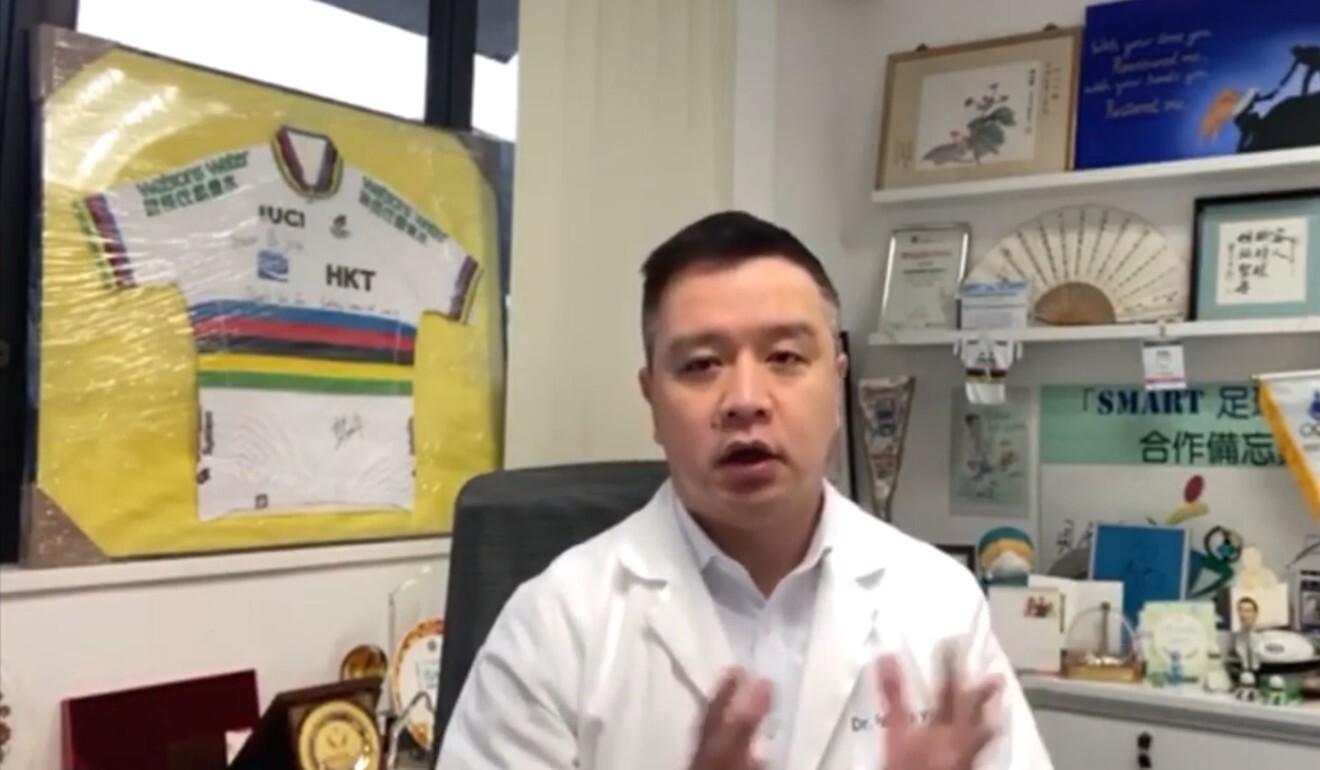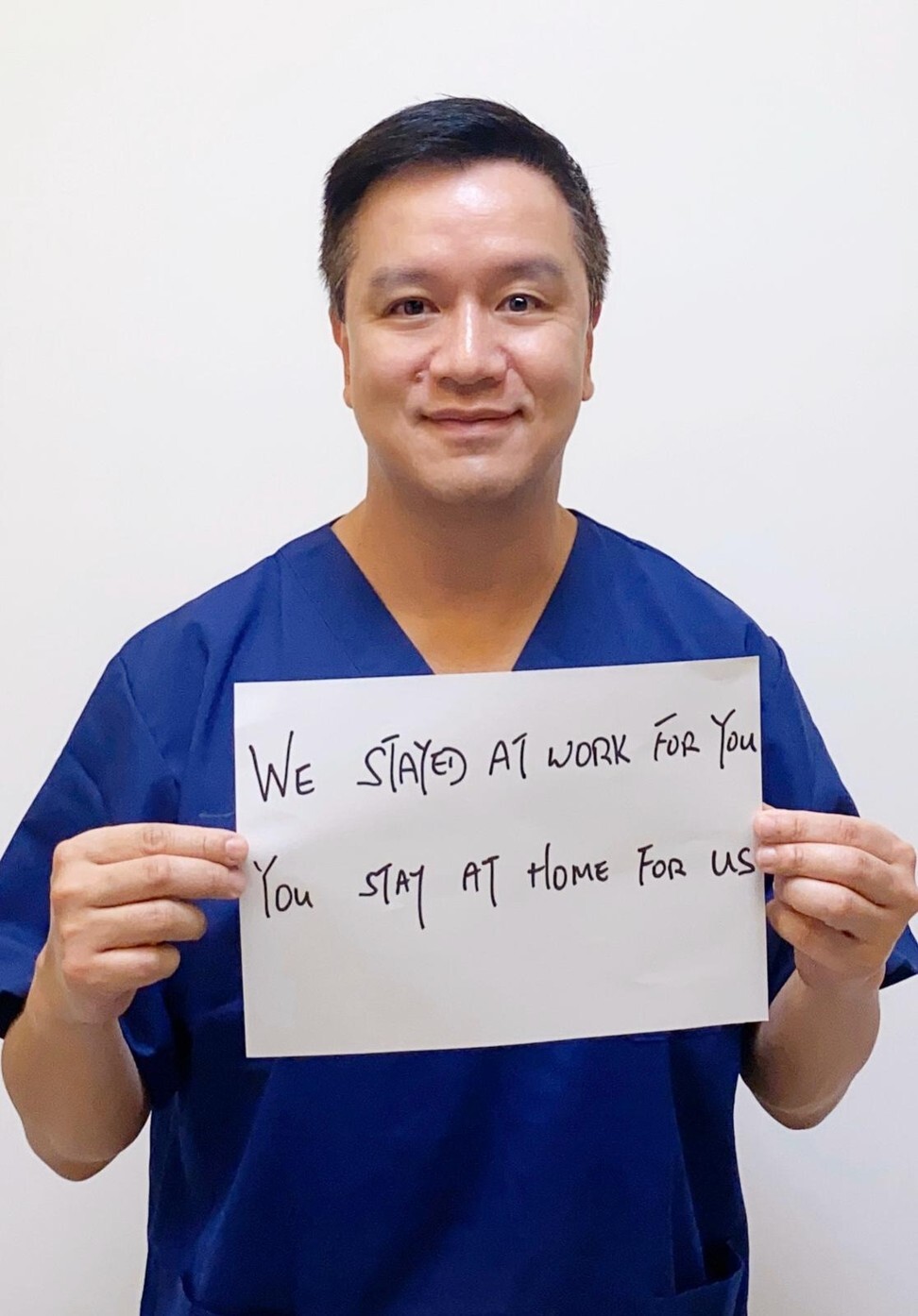Meet the real life heroes of our #BreakTheChain Campaign, the AFC doctors & medical practitioners who have joined forces to continue the fight against the Covid-19 pandemic
Let’s support them & #StayAtHome https://t.co/XCAOK1Yafk via @YouTube— AFC (@theafcdotcom) April 13, 2020
Coronavirus: how Hong Kong doctors used ‘messengers’ to enhance Covid-19 testing at Sports Institute and Kitchee football club
- Professor Yung Shu-hang says the city’s sports medicine experts were two or three steps ahead of the government in addressing the coronavirus threat
- The Chinese University of Hong Kong department head also helps arrange ‘telemedicine’ so doctors can communicate with athletes and coaches

Hong Kong’s sports medicine experts were confronted with a tricky situation while trying to prevent an outbreak among elite athletes soon after karate champion Lee Chun-ho tested positive for Covid-19.
According to Professor Patrick Yung Shu-hang, chairman of the department of orthopaedics and traumatology at the Chinese University of Hong Kong’s Faculty of Medicine, Hong Kong sports had to fend for themselves in the pandemic, with the government too busy battling other fronts to provide help.
The priority, he said, was to test as many athletes as possible and, initially, nurses and doctors were sent to the Hong Kong Sports Institute (HKSI) and other quarantine venues to collect deep throat sputum samples from athletes.
However, in late March, the institute closed its doors and no outsiders were allowed in or out. So Yung and his team resorted to using “messengers”.
“The Hong Kong government could not provide specific support for the HKSI athletes because different organisations around the city were crying for help,” said Yung, who is leading the Hong Kong sporting community’s fight against Covid-19.
“Once the HKSI closed its facility, we had to change our policy. Instead of sending doctors and nurses, we resorted to ‘messengers’, almost like Deliveroo or Uber Eats, except these were staff who had no contact with suspicious cases. These ‘messengers’ were asked to go into the HKSI or hotels where athletes were quarantined to collect samples for testing.
“We also arranged ‘telemedicine’ in which doctors would sit in front of a screen and talk to athletes or coaches, or even by phone, so we could build a doctor-patient relationship.”

Yung is also the chief medical consultant for the institute, chairman of the Hong Kong Football Association’s (HKFA) medical committee, chief medical consultant to Kitchee football club and an Asian Football Confederation (AFC) medical and anti-doping officer.
This week, the AFC produced a video paying tribute to its medical personnel who have joined the battle against Covid-19 in their respective jurisdictions with Yung playing a key role.
In addition, Yung is the main figure behind a campaign involving dozens of Hong Kong athletes to educate the public on how to stay safe during the Covid-19 lockdown, via a series of information videos.
Yung said they were happy to report that none of the more than 150 tests conducted on quarantined institute athletes returned positive. The three karate athletes and two coaches who tested positive were all imported cases after they had taken part in competition overseas.
“With all these infection control measures, we have been able to prevent an outbreak within the sporting community. So, I regard it as a success, so far,” said Yung, who is attached to Prince of Wales Hospital.
Yung was also at the forefront of efforts to prevent an outbreak among Hong Kong’s Kitchee football team after one of their coaches, Roberto Losado, contracted the disease. Losado’s wife was first to test positive after she returned from a trip to Europe.
The positive test came amid the HKFA’s decision to halt Premier League matches and other competitions, with the government also deciding to close all public sports facilities after briefly reopening them for matches behind closed doors.
“If the HKFA had continued, this coach would have joined his team at matches and training and would have posed a high risk and may even have caused an outbreak within Hong Kong professional football,” said Yung, who advised Kitchee to put the coach under self-isolation.
“Kitchee are a very well organised club, they have their own venue and offices and altogether have about 70 staff. It was important that they all self-isolate at home or in safe areas.
“Within 14 hours, we screened all personnel, players, coaches and staff. We took prompt action without waiting for any instructions from the government because they were too busy.
“We were proactive and two or three steps ahead and all expenses were borne by the Kitchee boss [Ken Ng]. All tests turned out to be negative so it was a great relief for the whole team.”
Yung had earlier advised the HKFA on protocols for the use of the Tseung Kwan O Football Training Centre (FTC) for league matches while proper public facilities were closed.
When the government briefly lifted the ban on using public venues – before it was implemented again in March when positive cases spiked in Hong Kong – Yung drafted rules for matches at the Tseung Kwan O Sports Ground, including how many people can use the changing rooms, how to conduct team meetings and other measures.
“The FTC was designed for training but was not ideal for so many teams coming together to train on the same day, and it’s even more unsuitable for matches in such situations. I was against use of this venue for competitions,” he said.
Yung praised the way the sporting community has come together to support each other, and educate the public on how to combat the pandemic. He helped to bring together 42 athletes from 18 sports, including cycling star Sarah Lee Wai-sze and fencer Vivian Kong Man-wai, to produce a video to encourage Hongkongers to stay at home.
He was also involved in producing seven educational videos on specific practices the public can perform at home to prevent the spread of the virus, including how to flush the toilet and washing hands.
“Because of my role in sports medicine, I am familiar with many athletes in the HKSI and the football family, so it helped in bringing all of them together to produce these videos” he said.

“Education is very important, for the public, athletes, coaches and others. We also need to engage our athletes to help educate the public because they attract attention easily.
“Our athletes are sort of celebrities and they can be more influential than any doctor in the city whenever they say something. Together, we can beat this virus.”